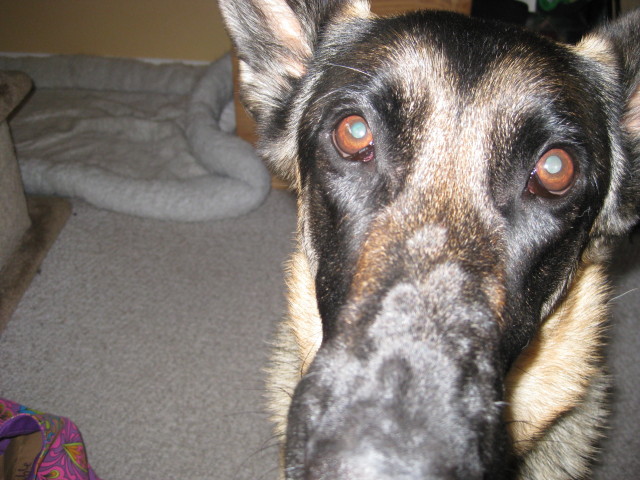QuestionHi Shelley. We currently live in a rural setting on 5 acres and have a 4-yr. old German Shepherd who is used to being able to roam our land freely. Within the next 6 months we will be moving to suburban housing plan on a small lot. I'm concerned with how she will adjust to this change and would like to know how I can make the transition less traumatic for her. Right now we take our daily walks off-leash through the yard. She does walk on-leash when we go to the local trails, but she's not very fond of it. We play a lot of "chase the tennis ball" now, but will not have much room at our new place. I'm trying to locate places where I can take her off-leash in our area, but I haven't found any place near us. I figure the move itself will be somewhat stressful for her, but compounded with the relative lack of freedom, I'm not sure what to do to help. Also of concern is her barking. Honestly, I don't know how much she barks because we can let her out without disturbing anybody, but whenever we do try to get her to stop barking, we are unsuccessful -- she just has to bark it out. :-) We've considered trying to find her a home where she could live the life she's accustomed to, but that's out of the question -- she's not our pet, she's part of our family. Do you have any suggestions to help make this easier for all of us?
Thanks so much for your help!
AnswerHi Margie,
Thank you for writing to me about your dog and your plans to move to suburban housing.
Moving can be extremely traumatic for a dog. For some dogs, even moving a piece of furniture can cause emotional disruption. Many people put their dogs in cageless boarding situations just prior to and during the move because dogs do not understand why their whole world is in disaray and being packed up in boxes. It can be very confusing for them. You can also ask a friend to take care of her for a few days until you are settled in the new place.
Be sure to keep your dog's belongings together so they can be placed in a similar place in the new house...crate, blankets, water/food bowl, toys etc should all be kept together and immediately placed in the new home in as similiar a location to the old one as possible.
Once your dog is in the new place, keep her routine as close to normal as possible, adding on extra exercise to dispel anxiety. If you usually take a 30 minute walk, up it to an hour or more.
Make sure that your dog is chipped and wears her collar and tags with the new information on them. I also recommend one of the GPS tracking systems..you can read about them on line and which ones have the best rating. This way if she happens to escape trying to find her way back "home" you will be able to track and recover her.
If your dog is crate trained, keep her in the crate during the first couple of days to get her used to the new place. If she's not crate trained I would suggest tethering her to one spot with her bed and a chew bone (chewing dispels anxiety- I recommend a raw marrow bone with the marrow extracted and replaced with some peanut butter and kibble or string cheese etc).
Take long walks around the neighborhood so that your dog becomes familiar with new surroundings. You will also meet other dog owners this way and perhaps if the dogs seem to get along, set up a play date. If you don't have a fenced yard in your new place, I suggest that you install one as soon as possible. This way you can have doggie friends visit and play. Nothing tires a dog out as much as playing with other dogs. Perhaps there is a doggie daycare center near you where she can go a few times a week or a dog park where she can get exercise and socialization.
I can't emphasize how important it is to keep your dog leashed. Many dogs try to find their way back to their original homes. This is why I recommend the GPS tracking system for her.
Be sure that the very first thing you do in your new home is to set up your dog's area so that she can relax and become acclimated. It should be kept a quiet area where she's not going to see all the boxes and confusion.
You can give your dog calming herbs prior to the move, during and after. I recommend Tranquility, which you can get on line. There is also Tran-Quil which can be added to her food.
As for barking, you can try a citronella collar. It works like a charm for most dogs. Some people say that using a squirt bottle with a sharp command like, "no bark" works wonders, especially with a little vinegar added to the water.
I commend you for not rehoming your dog because of the move. So many dogs are dumped in kill shelters because of a move and it's unnecessary and heart breaking. Your dog will adjust to the new home and there are all kinds of adventures in store for both of you! Enjoy all the wonderful years ahead of you together!
Best of luck with your move.
Shelley Davis

 Dog Worms
QuestionDog Poo
Dog Poo
QUESTION: Ive got
Dog Worms
QuestionDog Poo
Dog Poo
QUESTION: Ive got
 dog jumping fence
Question
dog
I have a 3 year old Staffordshire/Lab that
dog jumping fence
Question
dog
I have a 3 year old Staffordshire/Lab that
 pugs
Question
micah and lacy
my male and female are the same
pugs
Question
micah and lacy
my male and female are the same
 bumps on dogs nose
Question
bumps on nose
My dog has bumps on her nose..Sh
bumps on dogs nose
Question
bumps on nose
My dog has bumps on her nose..Sh
 I want to know how to remove my dogs spay stitches and the right way.
Question
this is the area that
I need to know how to r
I want to know how to remove my dogs spay stitches and the right way.
Question
this is the area that
I need to know how to r